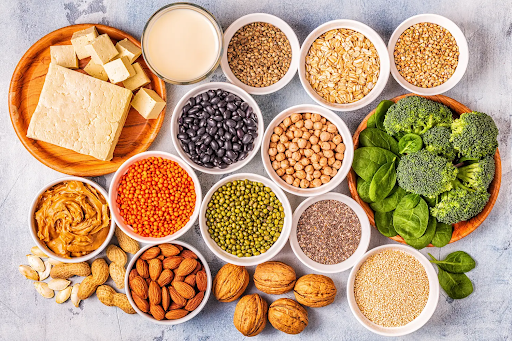The Ultimate Sugar Free Sauces Taste Test: Which One Wins?
The Ultimate Sugar Free Sauces Taste Test: Which One Wins?
Blog Article
All About Healthy And Balanced Food: Benefits of Taking On Plant Based Alternatives
The discussion bordering plant-based diet plans has acquired considerable attention in recent years. Many people are exploring the potential wellness advantages, dietary benefits, and ecological influences linked with these nutritional choices. As individuals become much more knowledgeable about their food's impact on wellness and sustainability, concerns emerge concerning the usefulness of embracing such a way of life. What details adjustments can one anticipate, and how might these choices improve not only personal health yet also the world's future?
Recognizing Plant-Based Diet Regimens
Although many individuals link plant-based diets mainly with vegetarianism or veganism, these diets can encompass a variety of consuming patterns that focus on whole, minimally processed plant foods. Such diet regimens frequently include fruits, vegetables, entire grains, legumes, seeds, and nuts, while eliminating or restricting pet items. This flexibility permits individuals to customize their dietary choices according to nutritional needs and personal preferences. Some might take on a largely plant-based diet while still sometimes consuming meat or dairy, typically referred to as a flexitarian strategy. The emphasis continues to be on incorporating even more plant foods, which can lead to a varied selection of tastes and meals. Recognizing these different analyses of plant-based consuming is important for valuing its accessibility and allure in contemporary food culture.
Wellness Benefits of Plant-Based Foods
The health advantages of plant-based foods are considerable, offering a nutrient density benefit that supports total health. Research study indicates that these foods can boost heart health and wellness and play a necessary role in efficient weight management. By integrating much more plant-based options, individuals might enhance their nutritional selections and promote lasting health.
Nutrient Thickness Advantage
Nutrient thickness plays an important function in the health and wellness benefits of plant-based foods, making them a compelling option for those looking for a well balanced diet plan. Plant-based foods, such as fruits, veggies, beans, nuts, and whole grains, are commonly rich in essential vitamins, minerals, and antioxidants while being lower in calories. This high nutrient density enables individuals to consume fewer calories while still fulfilling their nutritional demands. In addition, these foods are packed with dietary fiber, promoting gastrointestinal health and wellness and assisting in weight administration. By incorporating nutrient-dense plant-based options, consumers can improve their overall health, sustain their body immune systems, and minimize the threat of persistent diseases. Inevitably, the nutrient thickness of plant-based foods underscores their value in a health-conscious lifestyle.
Heart Wellness Enhancement

Weight Management Support
Along with promoting heart wellness, a plant-based diet regimen can substantially aid in weight management. This dietary method stresses whole foods such as fruits, veggies, beans, nuts, and whole grains, which are usually reduced in calories and higher in fiber contrasted to animal-based products. The high fiber material aids increase satiation, minimizing general calorie consumption. Additionally, plant-based diet regimens are frequently abundant in essential nutrients while low in harmful fats, making it simpler to preserve a healthy weight. Plant Based Beef. Research study indicates that individuals who take on a plant-based way of living have a tendency to have reduced body mass indexes (BMIs) and experience even more successful fat burning compared to those who eat meat-heavy diet regimens. As a result, accepting plant-based choices is a tactical option for effective weight management
Nutritional Worth of Plant-Based Components
Plant-based components are abundant in important nutrients, providing a varied range of vitamins, minerals, and anti-oxidants that add to general wellness. A contrast of healthy protein resources reveals that while pet products are usually considered as premium, several plant-based choices offer ample healthy protein and other beneficial substances. Understanding the nutritional worth of these components can help individuals make informed nutritional selections.
Crucial Nutrients in Plants
Nutrient-rich components discovered in plants use a diverse range of necessary nutrients that contribute greatly to total wellness. These ingredients are abundant in vitamins A, C, and K, which sustain immune feature, vision, and blood clot, specifically. Furthermore, plants offer crucial minerals such as calcium, magnesium, and potassium, essential for heart wellness, muscular tissue feature, and bone strength. The presence of fiber in plant-based foods help food digestion and advertises a healthy gut microbiome. Antioxidants, located abundantly in fruits and vegetables, assistance fight oxidative stress and anxiety and minimize inflammation. Many plant foods are reduced in calories yet high in nutrients, making them a superb selection for those looking for to preserve a healthy weight while making sure excellent nutrient intake.

Contrasting Protein Sources
Healthy protein sources vary considerably in their dietary profiles, with plant-based components supplying distinct advantages. Unlike animal proteins, which often have hydrogenated fats and cholesterol, plant proteins tend to be reduced in these undesirable components. Legumes, nuts, seeds, and whole grains are abundant in crucial amino acids, fiber, vitamins, and minerals. For circumstances, lentils offer high protein material along with significant iron and folate, while quinoa is a full protein, offering all nine vital amino acids. In addition, plant-based healthy proteins are commonly accompanied by antioxidants and phytochemicals that support total wellness. The change to plant-based healthy protein sources not only improves dietary consumption yet likewise lines up with sustainable dietary practices, lowering ecological influence and advertising long-lasting health benefits.
Environmental Influence of Plant-Based Eating
As awareness of environment adjustment expands, many individuals are exploring lasting dietary selections that can significantly decrease their ecological footprint. Plant-based eating has actually arised as a considerable contributor to minimizing greenhouse gas exhausts, which are primarily connected with livestock production. The growing of fruits, grains, veggies, and legumes generally calls for less sources, such as water and land, contrasted to pet farming. Furthermore, plant-based diet regimens can cause reduced logging, as much less land is needed for grazing livestock or expanding pet feed. By moving towards plant-based alternatives, customers can sustain biodiversity and advertise much healthier ecological communities. In general, embracing plant-based eating not just advantages personal wellness however also represents an important step toward environmental sustainability and conservation efforts.
Overcoming Common Misconceptions
While lots of people acknowledge the benefits of a plant-based diet regimen, a number of misunderstandings often prevent them from totally welcoming this lifestyle. A typical belief is that plant-based diets do not navigate to this website have sufficient protein; however, various plant sources, such as vegetables, nuts, and tofu, supply adequate healthy protein. Additionally, some think that this diet regimen is costly, when as a matter of fact, staples like beans, rice, and seasonal veggies can be fairly cost effective. Another false impression is that plant-based eating is overly limiting, whereas it actually uses a varied array of flavors and foods. Lastly, numerous stress that a plant-based diet plan might result in shortages, yet with appropriate preparation, individuals can acquire all required nutrients, consisting of minerals and vitamins, while enjoying a wide range of delicious dishes.
Tips for Transitioning to a Plant-Based Way of living
Making the change to a plant-based lifestyle can be an enhancing experience, though it commonly needs some advice to browse the initial useful source changes. Individuals are motivated to begin gradually, incorporating more fruits, vegetables, vegetables, and entire grains into their dishes while lowering meat and milk intake. Dish planning is essential; preparing a weekly menu can help ease the modification and avoid final harmful options. Discovering cooking approaches and brand-new recipes can additionally keep and improve the experience excitement about plant-based consuming. Furthermore, signing up with support teams or areas can provide inspiration and share valuable suggestions. Ultimately, remaining informed about nourishment guarantees balanced dishes, protecting against deficiencies while cultivating a healthy, gratifying plant-based lifestyle.
Delicious Plant-Based Meal Ideas
Checking out tasty plant-based meal ideas can motivate people to accept a more nutritious diet. One prominent option is a hearty quinoa salad, including cherry tomatoes, cucumber, and a zesty lemon-tahini dressing. Another favorite is a tasty lentil stew, packed with carrots, celery, and fragrant herbs, ideal for a reassuring supper. For breakfast, overnight oats made with almond milk, chia seeds, and covered with fresh berries supply a nutritious beginning to the day. Furthermore, a lively veggie stir-fry with tofu and a selection of colorful veggies can be a quick yet pleasing meal. Finally, luscious avocado toast on whole-grain bread, sprayed with seeds and flavors, provides a simple yet delicious snack. These meals display the variety and richness of plant-based eating.

Frequently Asked Questions
Can a Plant-Based Diet Plan Offer Enough Protein?
The inquiry of whether a plant-based diet plan can offer sufficient healthy protein prevails. Many resources, including vegetables, nuts, seeds, and entire grains, can meet protein requires successfully, supporting a balanced and nutritious diet for individuals.
Are Plant-Based Diet Regimens Appropriate for Kid?
The viability of plant-based diet regimens for children relies on mindful preparation. Adequate nutrients need to be assured, including proteins, minerals, check that and vitamins. With correct guidance, such diets can support healthy development and advancement in kids.
How Do I Eat in restaurants on a Plant-Based Diet plan?
Eating out on a plant-based diet plan includes seeking dining establishments with varied menus, asking for adjustments, and exploring vegan-friendly alternatives. Planning in advance and connecting dietary preferences can improve the eating experience while preserving nutritional selections.
What Prevail Irritants in Plant-Based Foods?
Typical irritants in plant-based foods include soy, gluten, nuts, and seeds - Sugar Free Sauces. Individuals complying with a plant-based diet needs to be conscious of these allergens and check out labels meticulously to stay clear of damaging reactions and ensure safe consumption
Can Plant-Based Diets Assist With Fat Burning?
Research study indicates that embracing a plant-based diet may facilitate weight loss because of its generally reduced calorie thickness and greater fiber web content. This mix can enhance satiety, helping people handle their caloric consumption effectively. Lots of people link plant-based diets generally with vegetarianism or veganism, these diet plans can include a vast array of consuming patterns that prioritize whole, minimally refined plant foods. Nutrient density plays an important duty in the health benefits of plant-based foods, making them a compelling option for those seeking a balanced diet. Plant-based diet regimens have been shown to markedly boost heart health and wellness, as they frequently have components that sustain cardiovascular feature. In enhancement to advertising heart health, a plant-based diet can significantly help in weight management. An usual belief is that plant-based diet regimens do not have adequate healthy protein; nonetheless, various plant resources, such as legumes, nuts, and tofu, offer enough protein.
Report this page